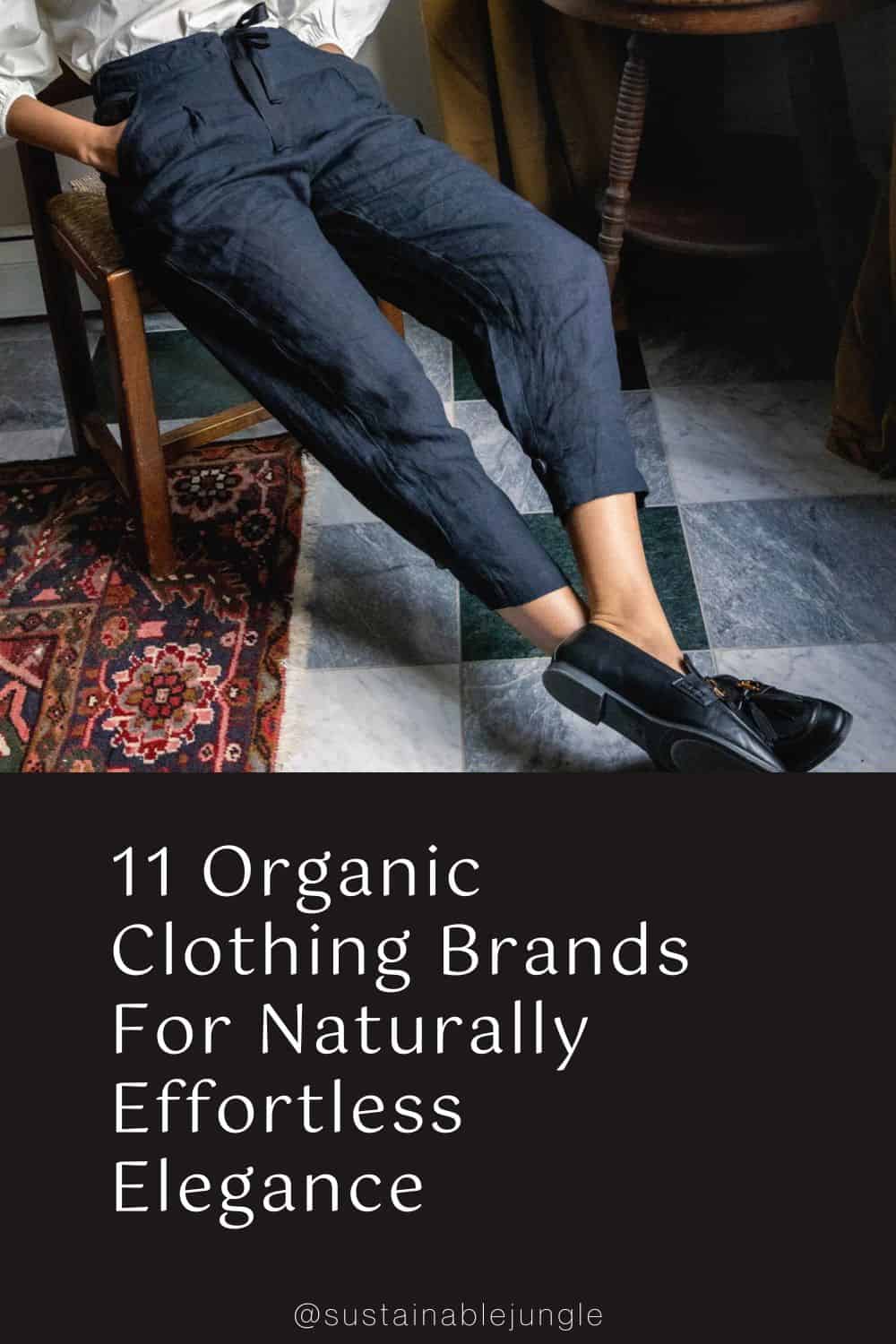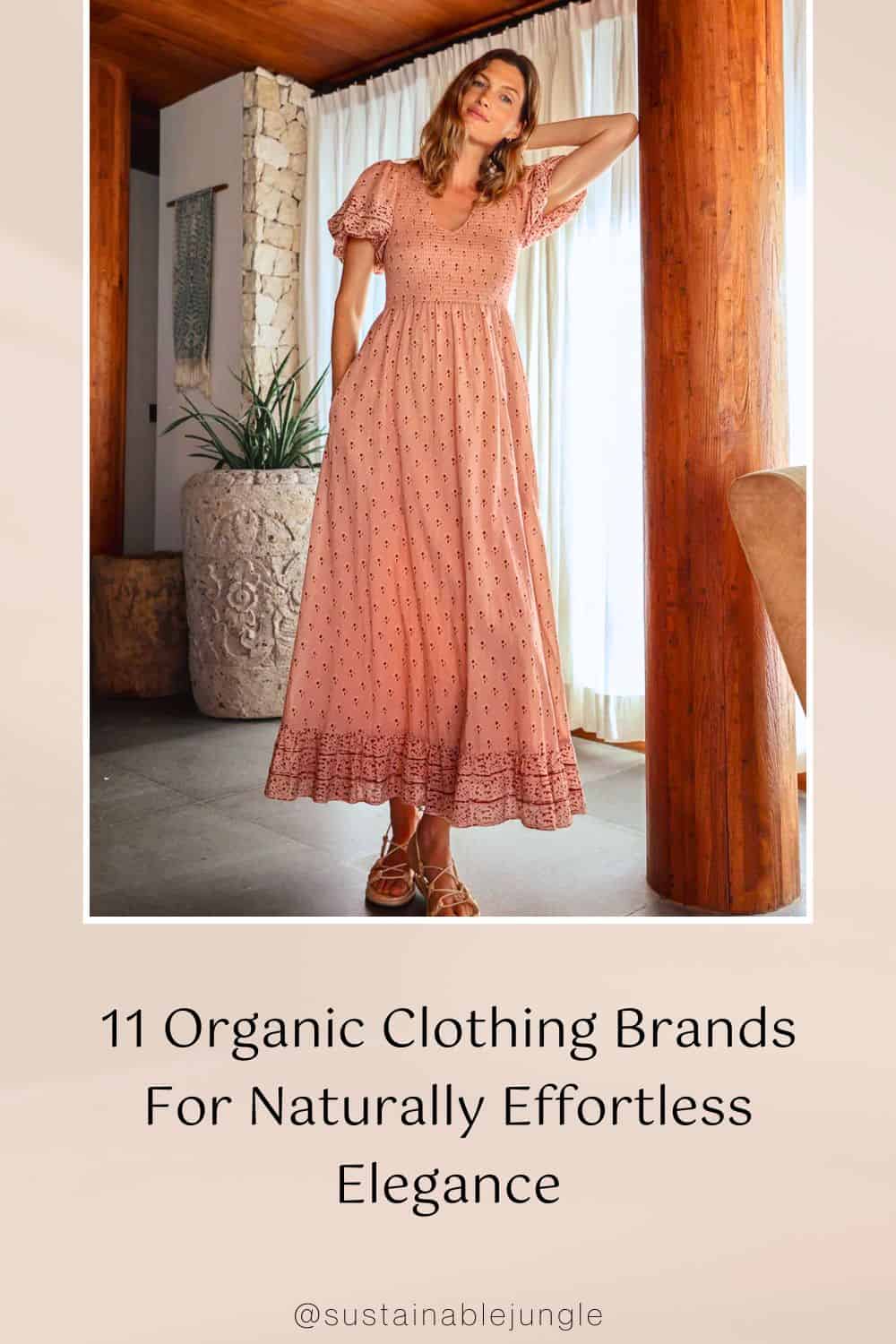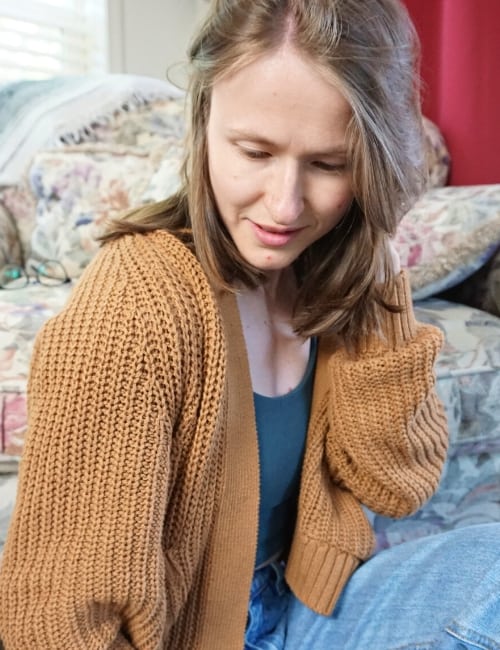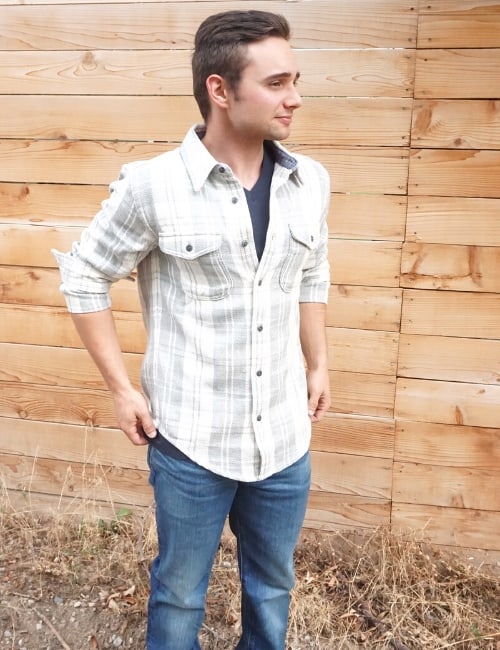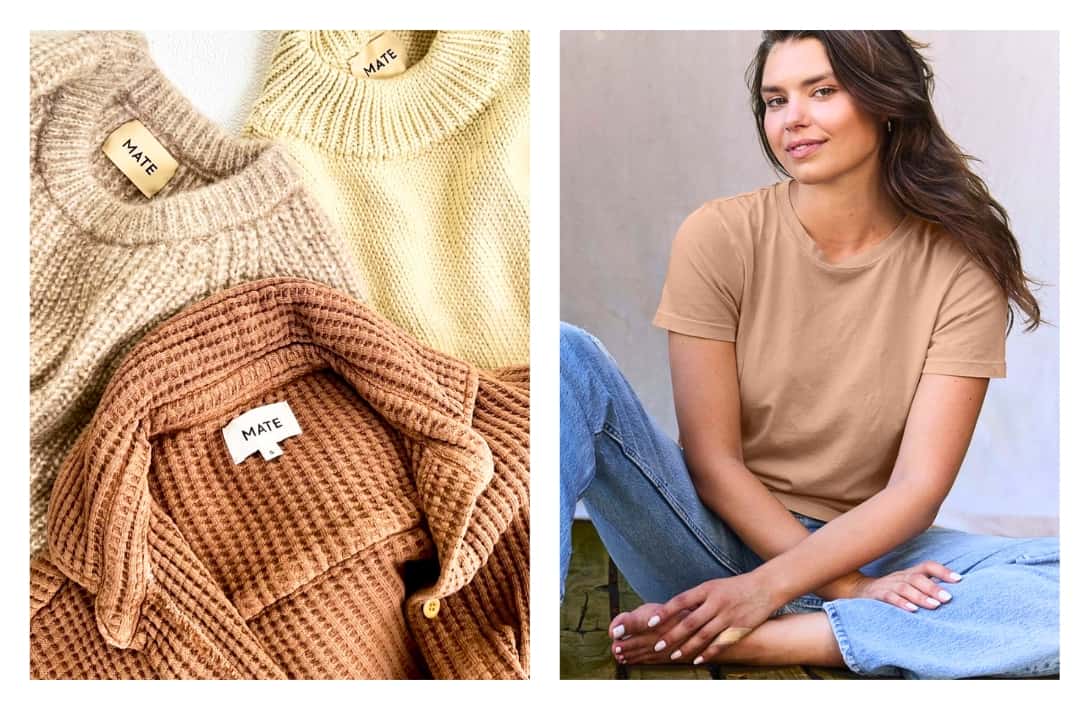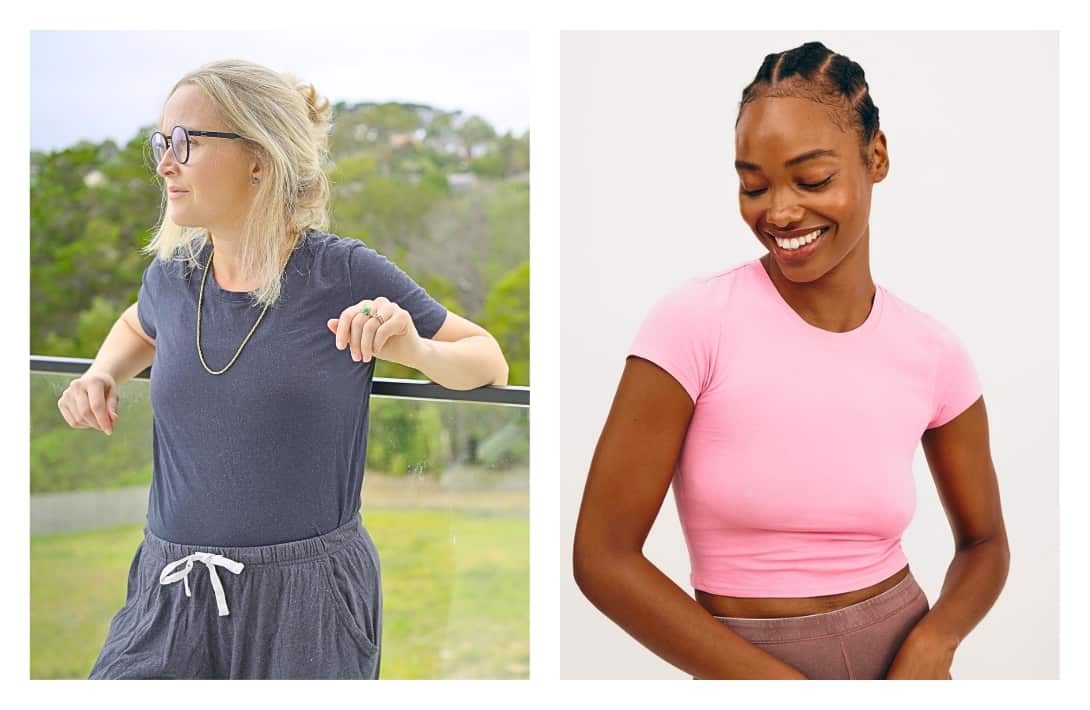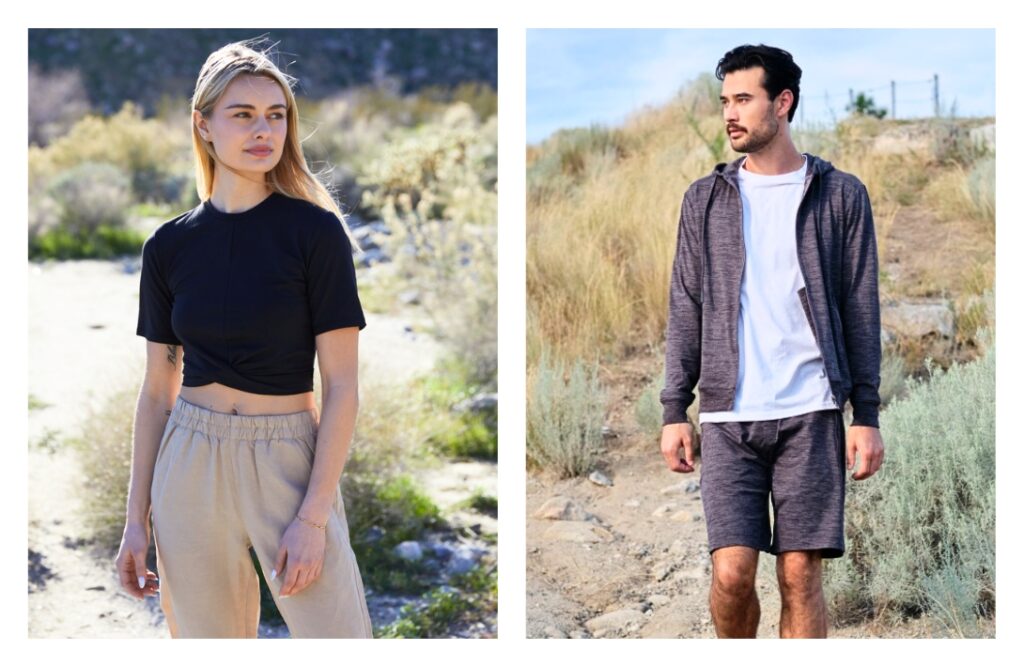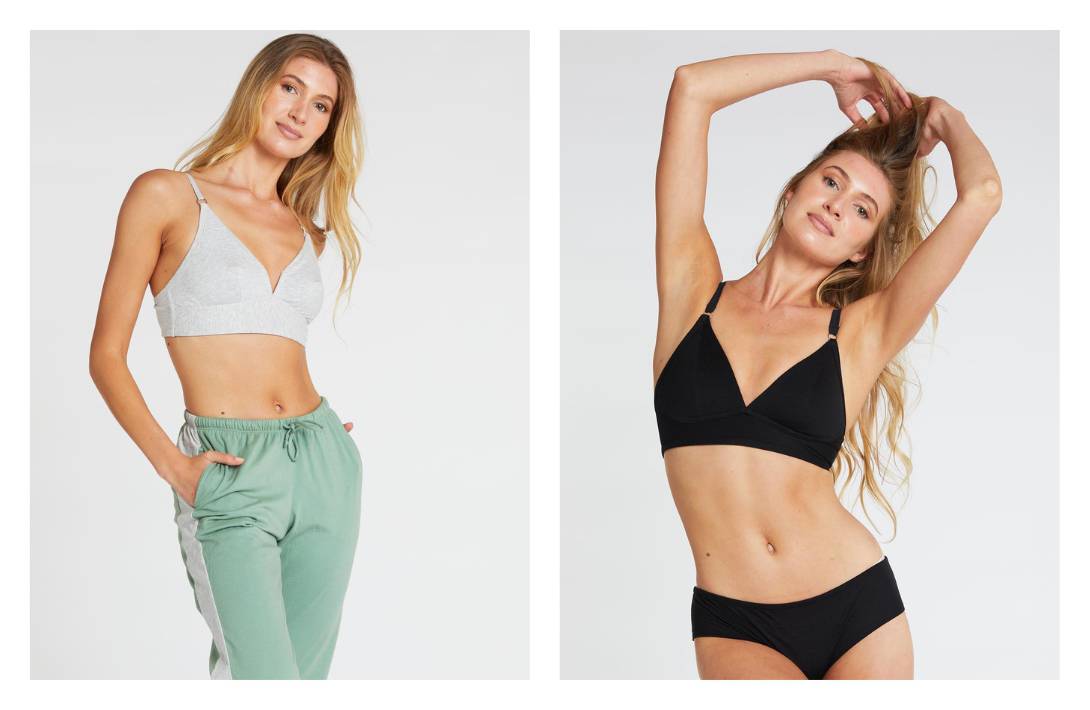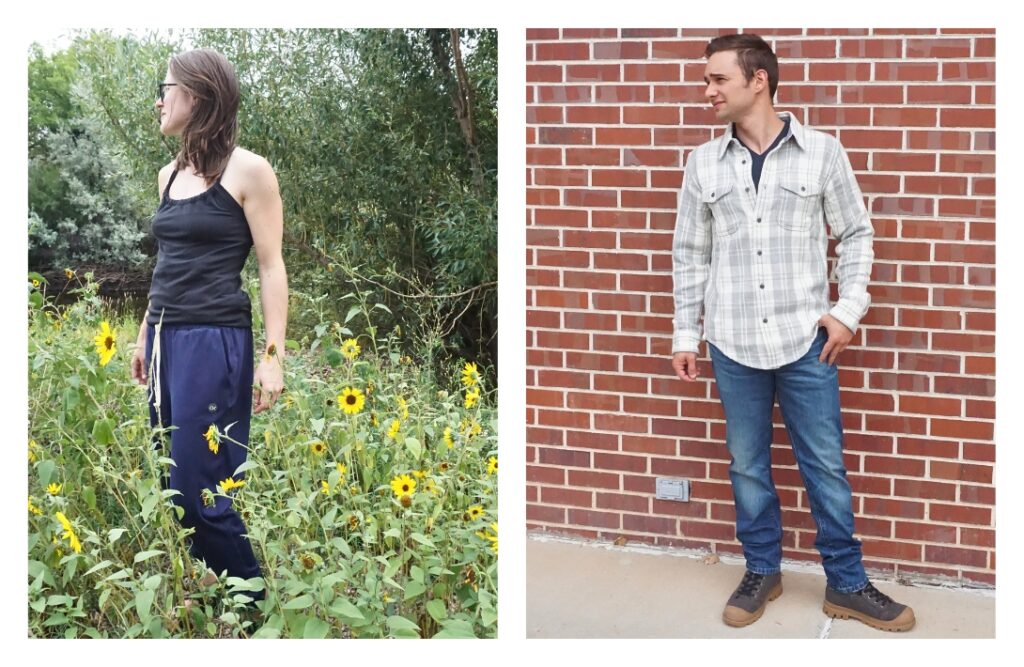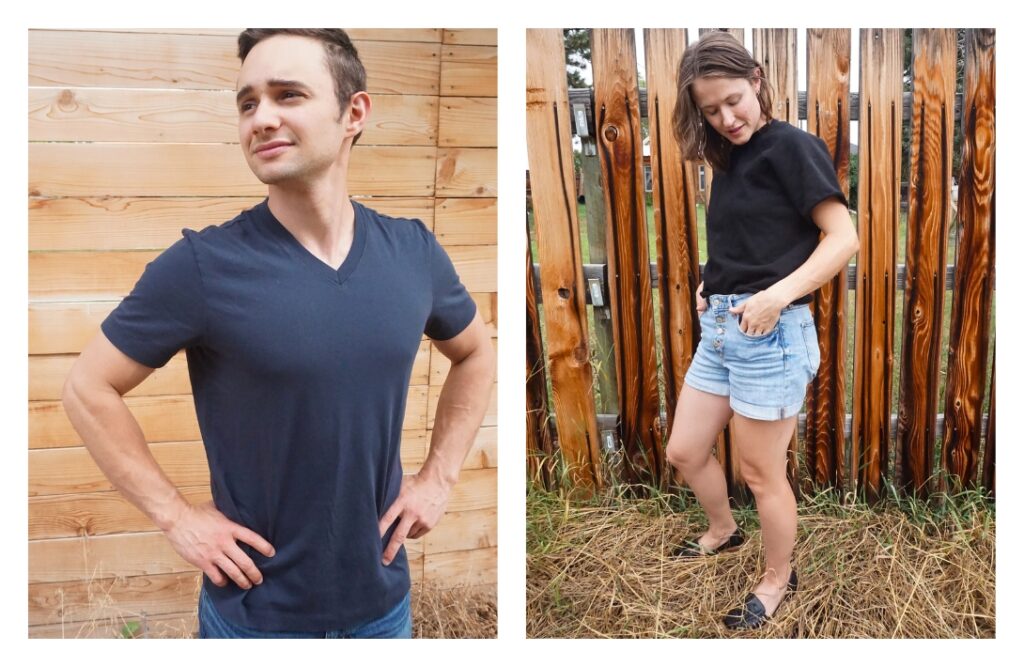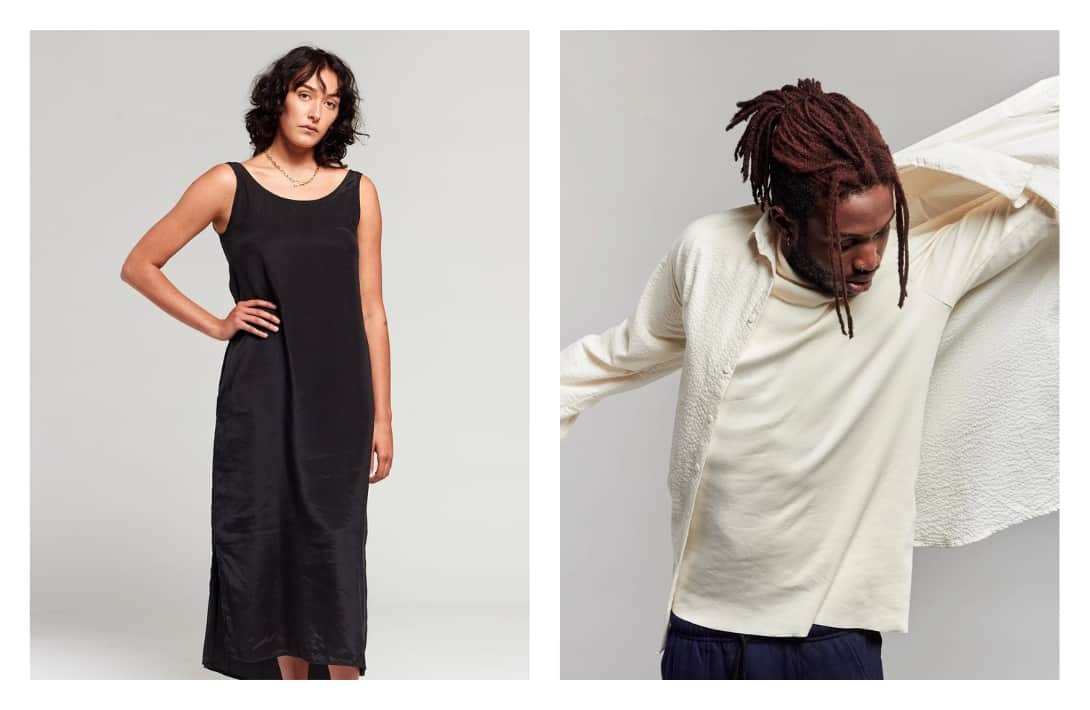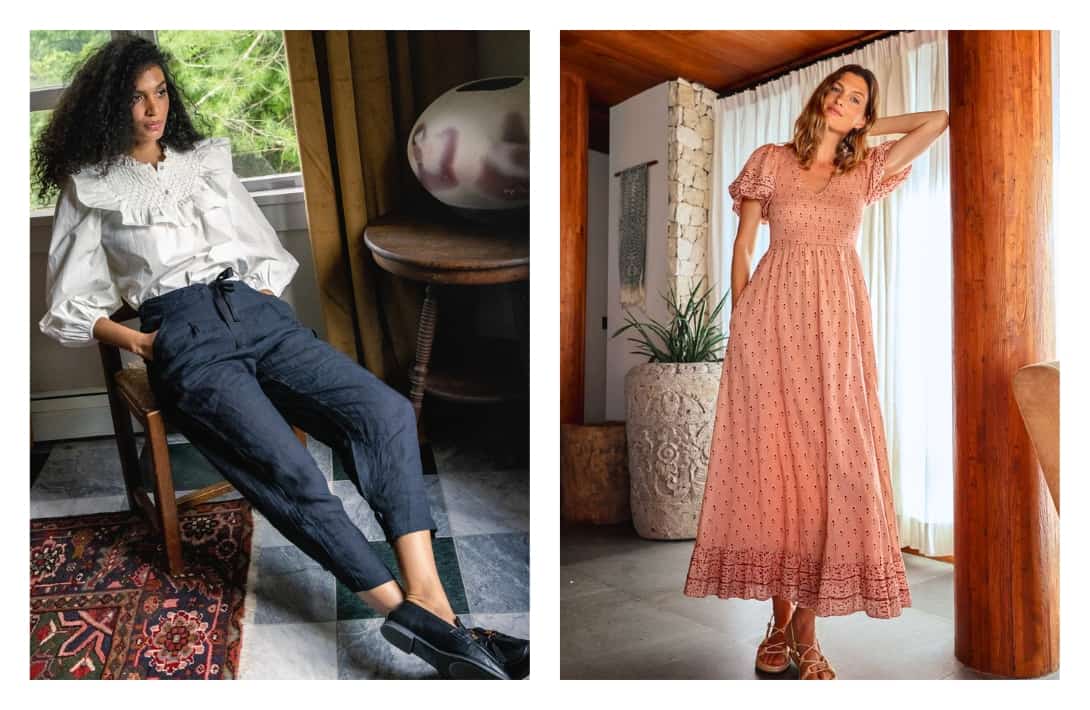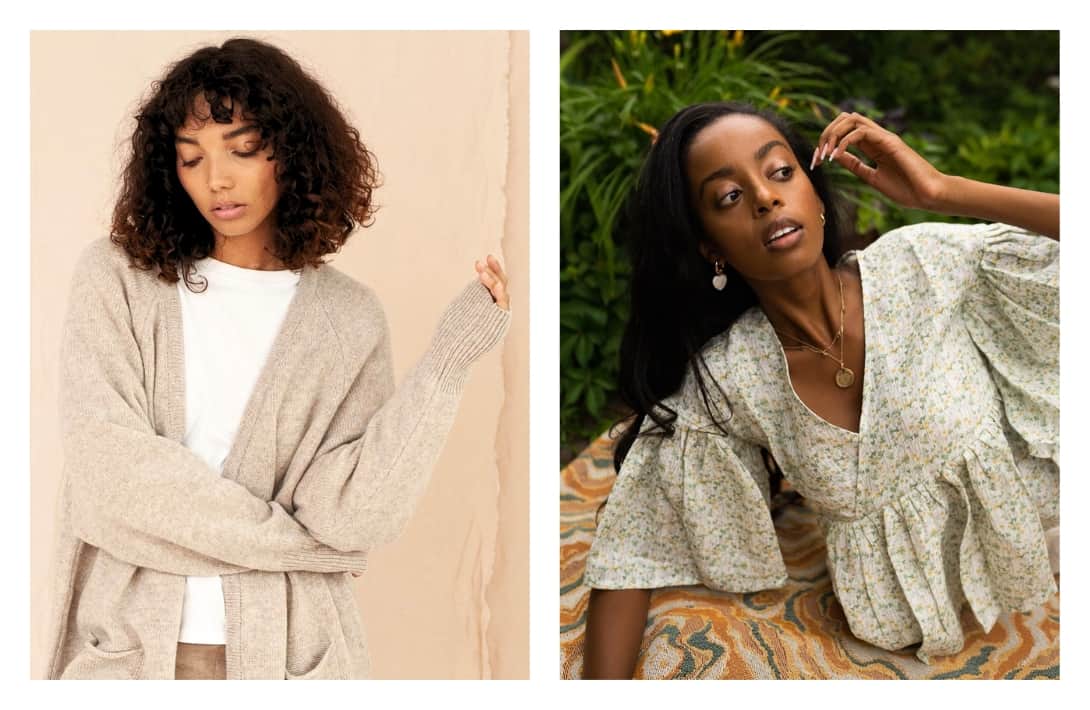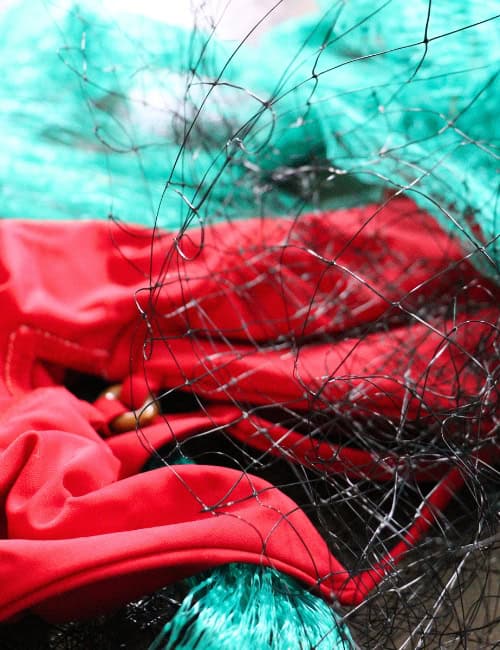11 Organic Clothing Brands For Naturally Effortless Elegance
Don’t panic—buy organic!
While many have been filling grocery shopping carts with organic bananas and coffee for years, the idea of wearing organic clothing is still relatively new.
But since fashion is one of the dirtiest industries in the world, it’s just as important.
The fact that an organic cotton t-shirt requires 91% less water to produce than one made of conventionally grown cotton is reason enough to start.
The best natural fiber clothing brands are putting it out there, so now it’s up to us to put it on.
Everything we recommend to you on Sustainable Jungle is independently researched and we ask all brands to confirm their claims. To avoid waste, we test products on an as needed basis. This post contains affiliate links. If you buy something through our links, we may earn a small commission. Learn more about why we do this here.
The Top Organic Clothing Brands For A Non-Toxic Fit
Pact uses fair trade certified organic cotton almost exclusively for its extensive range of high-quality tops, bottoms, jackets, sweaters, and accessories.
If you prefer natural fashion that keeps it simple, look no further than MATE the Label for their no-frills, durable, sustainable wardrobe staples made in the USA from certified organic cotton.
Organic Basics’ name tells you what they make, but it doesn’t tell you that everything is also carbon-neutral and helps support things like biodiversity.
If you’re wondering how we figured out where to buy organic clothing, we lay it all threadbare at the bottom of the article.
The Best Non-Toxic Clothing Brands
- Pact | Visit Store
- MATE the Label | Visit Store
- Organic Basics | Visit Store
- tentree | Visit Store
- Colorful Standard | Visit Store
- The Very Good Bra | Visit Store
- Outerknown | Visit Store
- Classic T-Shirt Company | Visit Store
- A.BCH | Visit Store
- Cleobella | Visit Store
- Beaumont Organic | Visit Store
1. Pact
About Pact
Price Range: $20–$148
Pact organic clothing is one of the OG affordable non-toxic clothing brands.
They started making organic cotton clothing before many others followed sustainable fashion suit.
Based in Boulder, Colorado, Pact has made it possible to outfit the entire family in non-toxic clothing materials.
From organic baby clothes to organic maternity clothes, there isn’t much you won’t find.
If all those acrylic sweaters in your closet lead you to believe knitwar can’t be natural, we challenge you to follow in our footsteps and don Pact’s 100% organic cotton sweaters—like the Classic Fine Knit Cardigan.
Pact’s Ethical & Sustainability Practices
Materials:
You don’t have to read the labels/product descriptions to know what a Pact product is made of.
This is they offer almost exclusively GOTS-certified organic cotton clothing.
Only a small handful of garments contain minimal elastane for stretch.
Supply chain & labor practices:
You find almost the entire supply chain for this organic clothing brand in India.
Over 3/4 of their fair trade cotton is grown there, and all clothing is made in Fair Trade Certified factories that meet strict criteria regarding environmental, social, and economic standards.
Carbon commitments & green practices:
Pact is creating a positive impact in ways that go beyond their use of organic materials, like using practices that conserve water and energy.
They use SimliZero to measure and offset the impact of each product and ship in carbon-neutral, FSC-certified recyclable paper Vela Bags.
Inclusivity:
Sizes for most products range from XS to XXL.
Community & charitable giving:
Pact’s Give Back. Wear Forward donation program accepts gently used clothes (they don’t need to be from Pact) and donates them to non-profits.
Pact suggests using the same box your Pact order arrives in; this allows customers to reuse the shipping materials and keeps valuable materials out of landfills.
2. MATE the Label
About MATE the Label
Price Range: $15–$268
Female-founded MATE the Label is a natural clothing brand women everywhere need to be mates with.
With the trademark Dress Clean™, it’s no wonder MATE the Label is also one of the best organic clothing brands, offering women’s organic tees, long-sleeve tees, joggers, ethical hoodies, sweatpants, organic cotton pajamas, tanks, and more.
All their garments are what we would consider to be essential—just like the cup of coffee embroidered on their oh-so-cozy Organic Fleece Embroidered Oversized Sweatshirt.
They also offer a much smaller selection of men’s and kidswear.
MATE the Label’s Ethical & Sustainability Practices
Materials:
MATE thinks highly of organic cotton, as their signature fabrics are 100% just that. Their Organic Lite fabric is soft and light, and the Organic Terry is even softer.
Only low-impact dyes and organic thread are used.
Supply chain & labor practices:
The organic cotton in MATE’s products is grown in Maharashtra, India before being knitted and dyed in a Los Angeles-based factory that adheres to fair trade regulations.
Around a million farmworkers are hospitalized yearly because of the chemicals used to grow and process conventional cotton.
By using organic cotton, MATE keeps farmers safe.
Carbon commitments & green practices:
Their “v localized” manufacturing chain, in which everything is cut, sewn, dyed, packaged, and shipped from said LA factory, means that MATE keeps their carbon footprint to a minimum.
They use 100% recycled shipping materials and replace poly bags with recyclable tissue paper.
They are also a Certified B Corp and Carbon Neutral Certified.
Inclusivity:
MATE provides sustainable fashion in sizes XS–3X.
Community & charitable giving:
They’ve donated hundreds of thousands of dollars to various environmental and social justice causes through their membership with 1% for the Planet.
3. Organic Basics
About Organic Basics
Price Range: $12–$150
Organic Basics is a Danish organic clothing company trying to improve the fashion industry by using sustainable materials and ethical production practices.
While they’re not exclusively a natural clothing brand (they also use recycled synthetics in their activewear), those that are natural are fully organic.
Scratch the natural fashion itch with their organic underwear, tees, organic bras, sustainable socks, and other layerable basics, like the Stretch Baby Tee which can be dressed up, down, and everything in between.
Organic Basics’ Ethical & Sustainability Practices
Materials:
Global Organic Textile Standard (GOTS) certified organic cotton clothing is Organic Basics’ organic ode to nature.
Some items are made from 100% organic cotton, while others in their organic clothing lines use a blend of 95% organic cotton with a bit of elastane.
Supply chain & labor practices:
As a Sedex member, this environmental clothing brand’s European fair trade factories are certified by GOTS, BSCI, and SA8000, and they also regularly visit them to ensure living wages are provided and child/forced labor is prohibited.
Everything is also sourced in Europe to keep things local and traceable.
Carbon commitments & green practices:
Organic Basics has a low-impact website, is carbon-neutral, and has an option for customers to purchase climate credits at check-out.
Their cotton isn’t just organic; it’s also regenerative; They’ve converted over 60,000 meters of farmland into that which uses regenerative agriculture.
Inclusivity:
Organic Basics shines for its use of diverse models and XXS–XXL sizes.
Community & charitable giving:
Their own Organic Basics Fund was created to provide grants to eco-minded initiatives. Past projects to review funding include Amazon Watch and Rewilding Europe.
4. tentree
About tentree
Price Range: $35–$328
tentree is all about “Earth-first apparel,” for which they use an array of both recycled synthetic and organic materials.
Hailing from Canada, the brand is one of the best for sustainable men’s clothing—but we’re equally head-over-heels for their organic women’s clothing.
A cozy favorite of ours is the Highline Oversized Turtleneck Dress, which is simultaneously comfortable to wear around the house and classy enough for date night.
We won’t be able to do their extensive range justice but just know it covers just about every layer possible—from ethical boxers to outerwear.
tentree’s Ethical & Sustainability Practices
Materials:
Along with other materials like recycled polyester, hemp, ECOVERO, and TENCEL™, organic cotton clothing is a core part of tentree’s line.
You’ll find an impressive selection there but know the majority are still blended with recycled polyester to give these clothes their active-ready potential, so shop carefully.
Supply chain & labor practices:
tentree is a Certified B Corp, not just for using Beautiful organic materials.
They have a strict code of conduct and are extremely transparent with their manufacturing chain and labor practices, including a Factory Ledger showing where each product is made.
Certifications from Fair Trade, Fair Wear Foundation, WRAP, BSCI, and SA8000 back them.
Carbon commitments & green practices:
When adding organic goodies to your online shopping cart, notice each product’s Eco Log, breaking down the water usage, waste, and CO2 emissions prevented using more sustainable fabrics.
Like other organic clothing companies on our list, tentree is Climate Neutral and sells offset packages to help shoppers follow suit.
Inclusivity:
Their sizes range from XS-XXL for women and XS-XXL for men.
Community & charitable giving:
tentree is in the business of planting trees (obviously). They plant ten trees for every purchase where the need to increase biodiversity is high, like Haiti, Senegal, Nepal, Indonesia, and Madagascar.
5. Colorful Standard
About Colorful Standard
Price Range: $11–$90
In the words of Colorful Standard, “We love colors, and we love simplicity”—two things we want in our natural fabric clothing brands!
You’ll find everything you need for your minimalist wardrobe in almost every color imaginable, including eco-friendly t-shirts, sweatpants, sweat shorts, hoodies, crew neck sweatshirts, and socks.
We’ve personally tested their Organic Crewneck sweatshirts and can confidently say they get two thumbs up for comfort and quality. We’re two years into wearing them frequently, and they still look like new.
Colorful Standard’s Ethical & Sustainability Practices
Materials:
Colorful Standard specialized in 100% GOTS-certified organic cotton clothing, but they also use extra fine Woolmark-certified merino wool in their accessories (soon to be recycled wool).
The organic processing is rounded out with non-toxic clothing dyes that have OEKO-TEX certification.
Supply chain & labor practices:
All manufacturing occurs in Portugal, known for its strict labor laws. If you’re in the area, drop by unannounced for a factory tour.
Carbon commitments & green practices:
Shipping directly from the factory to the consumer means no warehouses or middlemen in their production process, keeping emissions down.
To ensure their timeless clothing is “here for the long run,” CS prevents shrinking and other wear and tear by pre-washing all garments and making them with anti-pilling technology.
Inclusivity:
This organic brand offers XS-2XL sizes AND gender-neutral clothing options
Community & charitable giving:
Colorful Standard brings color to lives outside just their clothing.
Namely through the football club and youth activity center they built and continue to fund with 5% of their profits in the Democratic Republic of Congo.
6. The Very Good Bra
About The Very Good Bra
Price Range: $40–$99
The Very Good Bra is one of the best organic cotton clothing brands creating comfortable, affordable undergarments.
Stephanie Devine created the sustainable clothing brand after her win against breast cancer. She sought to develop the first biodegradable bra and succeeded.
Now, their organic bras and much more are continually busting (get it?) down barriers to more biodegradable clothing—like working toward creating Australia’s first textile composting standard.
Listen to our podcast with founder Stephanie Devine for all the details.
Styles like the V for Victory have zero underwires or plastic and are made from ultra-soft organic cotton.
The Very Good Bras Ethical & Sustainability Practices
Materials:
The outside of the bras is made from 100% organic cotton with TENCEL™ lining.
TVGB avoids polyester thread, nylon labels, synthetic elastic, or spandex/elastane. Instead, they use a small amount of natural tree rubber to give a little bit of stretchiness.
Supply chain & labor practices:
The Very Good Bra uses materials from several countries, like Australia, Germany, Italy, and Portugal.
Many of these Certified B Corp’s partners are WRAP and SEDEX-certified, providing workers with dignity, free healthcare, and fair wages.
Carbon commitments & green practices:
Some bras (like their organic nursing bras) are sold via pre-sale, helping prevent fabric and energy waste.
They also offer replacement straps, so you don’t have to buy a new piece when it wears out.
The Very Good Bra uses Sendle to deliver orders in Australia via neutral carbon shipping, but all packages are compostable or recyclable.
Inclusivity:
Bras are available in sizes between 8/30C and 16/38E, while the bottoms are available between 8/XS and 16/XL.
Community & charitable giving:
Customers can select one of three charities at check-out, and TVGB will donate $1 free of charge.
7. Outerknown
About Outerknown
Price Range: $98–$198
Outerknown may have an unlikely founder—professional surfer Kelly Slater—but they’re making waves in the world of sustainable fashion.
The partially organic brand is committed to protecting our people, oceans, and planet, and they do so with some of the most sustainable materials available.
While their use of recycled ocean plastics means they’re not exclusively natural, you’ll find plenty of organic, outdoor adventure-ready garments like eco-friendly sweatpants, tees, bottoms, fair trade sweaters, socks, and more.
They’re also one of the top organic men’s clothing brands and have created one of our all-time favorite shirts: The Blanket Shirt.
Biodegradable down to the corozo nut buttons, it’s made of tightly woven, super thick 100% organic cotton. We never knew a flannel shirt could be so cozy!
Outerknown’s Ethical & Sustainability Practices
Materials:
Outerknown’s mainstay organic materials include GOTS-certified organic cotton and ethical wool.
You find both 100% orgainc cotton or wool or blended with other fabrics.
Supply chain & labor practices:
Outerknown is out.of.this.world when it comes to an ethical supply chain.
Thanks to a partnership with Fair Trade USA, safe and fair working conditions are prioritized in their Chinese, Mexican, and Peruvian factories.
They were actually accredited by the Fair Labor Association before they shipped a single piece of clothing. Since producing its first garment, OK has supported more than 5,000 workers.
Carbon commitments & green practices:
We love that OK acknowledges that, while they are doing OK in regards to sustainable fashion there are always improvements to be made.
In their 2030 Sustainability Strategy, you’ll see plans for making their products completely circular, renewable energy improvements, and efforts to further support their workers.
Inclusivity:
Most garments run XS-XL.
Community & charitable giving:
Given Kelly Slater’s background and Outerknown’s use of recycled ocean plastic, it should come as no surprise that they also regularly donate money to organizations like Ocean Conservancy.
8. The Classic T-Shirt Company
About The Classic T-Shirt Company
Price Range: $64–$118
The Classic T-Shirt Company has some of the best organic clothing made in the USA.
With high-quality, soft, and luxurious GOTS-certified organic, they make some of the longest-lasting shirts to help the slow fashion cause.
The sustainable basics, like the Unisex French Terry Box Tee, are available in several stylish colors, allowing you to outfit your wardrobe with versatile pieces in any situation.
We tested out this tee and, with the thick cozy fabric of a sweatshirt and the versatility of a short-sleeved shirt, it’s become one of our go-to tops.
The Classic T-Shirt Company’s Ethical & Sustainability Practices
Materials:
The organic cotton t-shirts are made from 100% GOTS-certified organic cotton without harmful dyes or chemicals.
The organic clothes are durable, pre-shrunk, and don’t change size, shape, or color wash after wash.
Supply chain & labor practices:
The sustainable clothing brand ethically sources all of its organic GOTS-certified cotton from local farms in India.
Afterward, the garments are manufactured in Los Angeles, California. The Classic T-Shirt Company provides a dignified working environment, reasonable hours, and exceptional wages for all its employees.
Carbon commitments & green practices:
The Classic T-Shirt Company aims to craft long-lasting, durable, and high-quality biodegradable clothing.
Each order is shipped in 100% plastic-free, recycled materials.
Inclusivity:
The organic clothing for men’s sizes ranges between XS—XL, while women’s range between XXS—XXL.
Community & charitable giving:
The Classic T-Shirt Company donates 1% of its sales to various organizations, including Water for People, Armenia Tree Project, and The Ocean Cleanup.
9. A.BCH
About A.BCH
Price Range: $60–$682
A.BCH has a different approach compared to other organic fashion brands; they provide product rentals and believe in circular designs.
All pieces are designed for recycling, composting, or repurposing.
Gender-neutral jackets, hoodies, sweaters, pants, tees, and more are available in high-quality fabrics.
We love pieces like the Unisex Oversized Shirt for elevated styles that remain timeless in any wardrobe.
A.BCH’s Ethical & Sustainability Practices
Materials:
As one of the best natural clothing brands, A.BCH makes sustainable fashion pieces out of organic cotton, organic linen, recycled cotton, hemp, RWS Merino wool, and TENCEL™.
Many of the garments utilize GOTS-certified organic cotton without any harmful chemicals, dyes, or finishes.
Supply chain & labor practices:
A.BCH works with ethical suppliers with carbon-neutral and fair trade certified factories, audited by GOTS, Fair Trade, or Fair Wear Foundation.
Garments are produced locally in Melbourne, Australia, at an in-house carbon-neutral factory where they provide workers with fair conditions and well above living wages.
They use local, raw, and other sustainable materials following manufacturing guidelines from the Ethical Clothing Australia Accreditation.
Carbon commitments & green practices:
In addition to reducing consumption by offering rentals, each garment is crafted with its lifecycle in mind, meaning it must be recyclable or compostable once it wears out.
A.BCH takes back branded pieces to assess them for recycling or repurposing. Reused pieces are blended into new sustainable fabrics to minimize waste.
You can currently buy Perfectly Imperfect factory seconds, but stay tuned for their pre-loved platform coming soon.
Carbon emissions produced from their wind-powered facility are offset via the UN Certified Emission Reduction certificates.
Inclusivity:
When it comes to inclusivity, A.BCH makes numerous gender-neutral clothing, which we can’t get enough of.
Otherwise, their organic clothing for women is available in XXS-3XL and 1–5, and men’s in XXS–3XL.
10. Cleobella
About Cleobella
Price Range: $120–$548
Women’s organic clothing brands like Cleobella produce striking garments made from exceptional materials.
You can find a wide range of artisan-made clothing, like dresses, jackets, sweaters, handbags, bottoms, and more.
Stunning Ankle Dresses are made from 100% GOTS-certified organic cotton following a traditional dyeing and manufacturing process.
Cleobella’s Ethical & Sustainability Practices
Materials:
Cleobella utilizes 100% GOTS-certified organic cotton from India and Bali, alongside leather, polyester, and wool. We recommend sticking to just their organic cotton clothing if you can.
Supply chain & labor practices:
The designs are drawn in California, then submitted to India to finish the prints.
For that, they partner with master woodblock makers from small artisan farms to hand carve the prints onto teak woodblocks. Then, the woodblocks are dipped into water-based vegetable dyes and hand applied to the fabrics.
Each of their partners must commit and annually sign their Ethical Trade Agreement for fair wages, safe working conditions, and zero tolerance for child labor.
Carbon commitments & green practices:
They use low-impact sustainable dye techniques that ensure pieces are high-quality and built to last, color included.
Cleobella’s wholesale business is cut to order, helping them eliminate overproduction waste.
Inclusivity:
Organic cotton clothing for women can be found in sizes XS–XL.
Community & charitable giving:
Cleobella partners with Beam to donate to various organizations. 1% of every purchase is donated to your chosen non-profit, like One Tree Planted, The Surfrider Foundation, and Girls Inc.
11. Beaumont Organic
About Beaumont Organic
Price Range: $27—$360
As far as organic clothing brands in the UK, none do it quite like Beaumont Organic.
There are countless environmentally friendly pieces for women, including dresses, tops, bottoms, sweaters, undergarments, and nightwear.
For 100% organic cottong clothing, we’re loving the looks of their Organic Cotton Trousers for their bright colors, elegant fit, and sustainable materials that’ll keep the planet as comfortable as these will keep you.
Beaumont Organic’s Ethical & Sustainability Practices
Materials:
Most pieces are made from organic cotton (GOTS-certified), either pure or with a small bit of elastane.
Other sustainable fashion pieces utilize OEKO-TEX-certified Italian linen, recycled denim yarn, and responsibly sourced wool.
Supply chain & labor practices:
The all-natural clothing brand believes in transparency, publishing its list of suppliers and partners online.
Currently, 97% of Beaumont Organics production happens in Portugal, so they can visit throughout the year. The rest is in the UK
Carbon commitments & green practices:
Customers can click a ‘sustainability’ tab on each product to find out exactly what’s gone into making the garment.
87% of the production process is within a 300-mile radius of Braga, Portugal, where they source the majority of their raw materials.
UK customers have access to product repairs and a circular resale program.
Inclusivity:
The non-toxic women’s clothing is available in sizes between XS–L (UK 8-18).
Community & charitable giving:
The organic fashion brand gives back through the Beaumont Organic Foundation, which empowers several health and education initiatives across Fiji.
Did you know we Have a Newsletter?
We cover the latest in sustainable living, fashion, zero waste, beauty, travel, finance and more…
Why Choose Organic Clothing Brands?
We’re in the midst of a plastic crisis, and we hate to be the bearer of bad news, but your favorite sweater might be part of the problem.
60% of all clothing contains synthetic fabrics derived from petroleum and other fossil fuels. The demand for synthetics is growing far faster than the demand for natural fibers like cotton, hemp, and wool.
Fast fashion especially relies on synthetic fibers because they are cheap and abundant.
Aside from increasing the demand for fossil fuels and making forever-piles in our landfills, synthetic garments also harm the environment by releasing microplastics (between 700,000 and one million per garment) into the waterways every time they go through a wash.
These not only pollute water but kill fish and worm their way into our very food chain.
Synthetic fibers are obviously a big problem, but natural fibers produced through inorganic means also have their downside.
Conventional cotton is the dirtiest crop in the world due to its insatiable appetite for water and chemicals. Pesticides, insecticides (24% of all sold), and synthetic fertilizers (one-third of a pound for one measly t-shirt) all go into conventional cotton farming.
Okay, sure, but do clothes need to be organic? What about non-organic sustainable clothing brands?
And what is the difference between organic and sustainable clothing?
Well, a sustainable clothing brand might use a variety of fabrics, including recycled synthetics.
This is good from the standpoint of using materials that would otherwise go to waste, but doesn’t necessarily address the toxins that might be present in synthetic fibers.
If you’re trying to live a non-toxic natural life, clothing shouldn’t be made of synthetic fabrics—even recycled ones.
How We Found The Best Organic Cotton Clothing Brands
Going shopping for organic garments is as fun as going shopping for organic snacks (and have you seen all the crazy concoctions in the aisles of Whole Foods?!).
But what about organic clothing?
As organic fabrics are becoming more integral in the sustainable fashion world, let’s chat about what all we look for in the best organically-inspired eco-friendly clothing brands:
Materials:
What does it mean when clothes are organic?
It means they’re made of fabrics made of have been grown and processed without chemical inputs (i.e. pesticides, fertilizers, solvents, dyes, etc).
The most popular is organic cotton clothing, but we’re starting to see sustainable fabrics get the “organic” stamp, too, bamboo fabric and hemp fabric.
Contrary to popular belief, “organic” extends beyond the farm. It’s a ‘seed-to–shelf’ term that applies to a product’s entire production journey. If your organic cotton clothing has been dyed with standard azo dyes, it’s not technically organic.
That’s why we also look for natural dye clothing brands.
The best organic clothing brands will have third-party certifications to back up their organic claims—though as recent GOTS certification greenwashing has taught us, even they’re not infallible.
Still, they’re the best defense we consumers currently have, though we encourage you to ask questions of the chemical-free clothing brands, too.
- Certifications: Global Organic Textile Standard (GOTS), Organic Trade Association (OTA), OEKO-TEX, Woolmark
Supply chain and labor practices:
Being socially responsible goes hand in hand with being sustainable. When it comes to this, transparency is key.
We like to get into the nitty-gritty of each production process—where did processing take place, who was involved, how often did they work, how were they treated, how were they compensated, etc.
Fortunately, many of these fair trade brands have very detailed records about how their garments are produced and by whom.
- Certifications: Business Social Compliance Initiative (BSCI), Sedex, Social Accountability International (SA8000), Worldwide Responsible Accredited Production (WRAP), Fair Wear Foundation, B Corporation (B Corp), fair trade
Carbon commitments & green business practices:
Beyond using organic fabrics, we go crazy over a brand offering garment recycling programs that use reusable/compostable/recyclable packaging or offsets a portion of their emissions.
We’re also big suckers for those conscious about their water and energy usage and those that implement practices to reduce/reuse resources and emissions.
Inclusivity:
The fashion industry has a lot of room for improvement when it comes to inclusivity, sustainable fashion included, but we were happy to see some brands offering plus sizes.
Community & charitable giving:
Whether donating money or donating goods, we’re extra happy to find organic clothing brands that give back.
Final Thoughts On Natural Clothing Brands
Wearing clothes made with natural materials is great and all, but wearing organic clothes made with natural materials is even better.
In a world where conventional cotton means an insatiable hunger for pesticides and insecticides, it’s clear that we need to make the transition towards organically grown cotton. It is (along with other organic fibers) the cream of the crop (literally) when it comes to earth-friendly fashion.
Before you go on an organic clothing shopping spree, remember the most earth-friendly fashion is what’s already hanging in your closet or on a virtual rack at an online thrift store.
And because organic is for all, be sure to share this article so all your loved ones know why and where to buy organic clothing, too.
Pin these:
